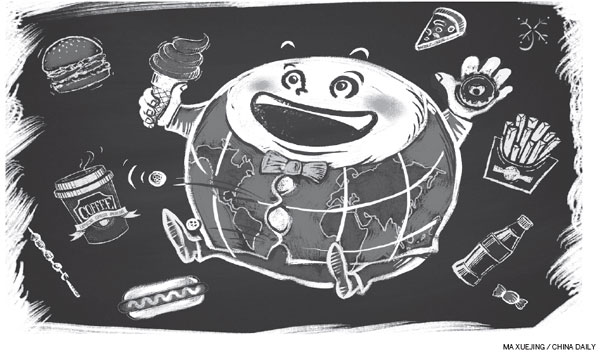Obesity poses big threat to world
By Richard Dobbs and Boyd Swinburn (China Daily) Updated: 2015-04-14 07:35

Education on obesity risks is important, as is taking personal responsibility for one's health, fitness and weight. But all the evidence show that relying on knowledge about obesity and willpower is not enough to offset the evolutionary instinct to overeat. These effects are compounded by lifestyles that require little or no physical activity.
MGI was able to collect enough data on 44 of the 74 potential interventions to develop an initial assessment of their impact if they were scaled up to a national level. If the United Kingdom, for example, were to deploy all 44 interventions, it could rein in obesity rates and help roughly 20 percent of its overweight and obese population return to a healthy weight in 5 to 10 years.
Over the long term, savings from reduced healthcare spending and gains from higher productivity could outweigh the investment needed to deliver interventions.
For many countries, tackling obesity will require a national - if not global - effort. Only a coherent, sustained portfolio of initiatives, implemented on a large scale, will be effective. No single entity - government, retailers, consumer goods companies, restaurants, employers, media organizations, educators, healthcare providers or individuals - can address obesity on its own.
We do not yet have all the answers when it comes to the best way to tackle obesity. But the rapid rise in obesity rates around the world creates a strong case for experimenting with interventions, to see what works. Today, investment in obesity research worldwide amounts to some $4 billion a year - just 0.2 percent of the estimated social costs of obesity. We can - and must - do more.
Richard Dobbs is a director of McKinsey & Company and of the McKinsey Global Institute, and Boyd Swinburn is professor of Population Nutrition and Global Health at the University of Auckland and director of the World Health Organization Collaborating Center for Obesity Prevention at Deakin University in Melbourne.
Project Syndicate

I’ve lived in China for quite a considerable time including my graduate school years, travelled and worked in a few cities and still choose my destination taking into consideration the density of smog or PM2.5 particulate matter in the region.











